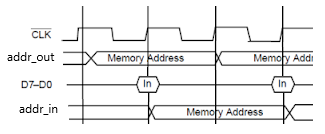When an operand encodes an address, and that address changes the "memory address register" and the word in memory being addressed, it seems like timing issues could be a problem. Examples, LDA instruction (load address from memory, load word from that address. )
Illustrated in timing diagram below.
How is this usually solved (could be different across different CPUs but there are probably trends. )
Is a temporary register used (the "memory address register" could load and output in two separate steps), or is the timing issue just not a problem and tends to work out regardless?
Example LDA with two step "memory address register",
when LDA_1 => -- Load accumulator from operand
addr_in <= dr;
state := LDA_2;
when LDA_2 =>
addr_out <= addr_in;
state := LDA_3;
when LDA_3 =>
accu <= dr;
state := load_opcode;
Timing with temporary "address in" register illustrated below,


